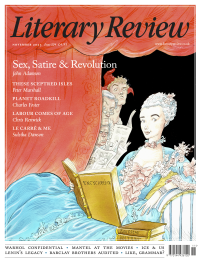Neil Gregor
Requiems for the Fallen
Time’s Echo: The Second World War, the Holocaust, and the Music of Remembrance
By Jeremy Eichler
Faber & Faber 400pp £25
Two days after Hitler’s appointment as chancellor of Germany on 30 January 1933, the Austrian-Jewish arch-modernist composer Arnold Schoenberg was forced to endure a speech in which Max von Schillings, the president of the Prussian Academy of Arts, endorsed the Führer’s ambition to ‘break the Jewish stranglehold on Western music’. Within three months, Schoenberg had gone into exile in the United States. It was a milestone in his long transformation from assimilated German nationalist (he had converted to Protestantism before the First World War) to reidentification with Judaism and adoption of the Zionist cause. Both his re-embrace of his Jewishness and his awareness of the persecution and murder taking place back in Europe threaded their way through his compositions, culminating in his creation of A Survivor from Warsaw, which is one of the four musical works that stand at the centre of this thoughtful, stimulating and readable meditation on music’s capacity to evoke and sustain a memory of the violent past.
If Schoenberg responded to the Holocaust by writing about its victims, Richard Strauss – whose career is juxtaposed to that of Schoenberg very tellingly – found nothing more important to write about in 1945 than the bombing of Munich’s opera house. The building had deep personal significance for the composer because his father had played in the theatre’s orchestra for decades, and also because it was closely associated with the performance of Strauss’s own operas. This wilfully blinkered, venal opportunist could not bring himself to recognise that there might be more important things to shed tears over than himself. Eichler starts off making the best case possible for the man, taking at face value his claims of ignorance of the camps and omitting some of the more damning evidence of his Nazi sympathies (such as his composition for Hans Frank, the ‘Butcher of Poland’). One senses an initial reluctance to accept that the composer of some of the 20th century’s most glorious music could have failed so miserably as a human being. Eventually, however, Eichler is forced to bow to the compelling weight of his own material, and his wry observation that in listening to the Metamorphosen now we might wish to ‘broaden its circle of moral concern’ hits the nail right on the head.
While Schoenberg and Strauss represent two very different German reactions to Nazism, Eichler uses the examples of Benjamin Britten’s War Requiem and Dmitri Shostakovich’s Thirteenth Symphony to consider non-German musical responses to war and genocide. He thoughtfully shows how Britten’s work reflects ‘one of the defining tendencies of

Sign Up to our newsletter
Receive free articles, highlights from the archive, news, details of prizes, and much more.@Lit_Review
Follow Literary Review on Twitter
Twitter Feed
Russia’s recent efforts to destabilise the Baltic states have increased enthusiasm for the EU in these places. With Euroscepticism growing in countries like France and Germany, @owenmatth wonders whether Europe’s salvation will come from its periphery.
Owen Matthews - Sea of Troubles
Owen Matthews: Sea of Troubles - Baltic: The Future of Europe by Oliver Moody
literaryreview.co.uk
Many laptop workers will find Vincenzo Latronico’s PERFECTION sends shivers of uncomfortable recognition down their spine. I wrote about why for @Lit_Review
https://literaryreview.co.uk/hashtag-living
An insightful review by @DanielB89913888 of In Covid’s Wake (Macedo & Lee, @PrincetonUPress).
Paraphrasing: left-leaning authors critique the Covid response using right-wing arguments. A fascinating read.
via @Lit_Review